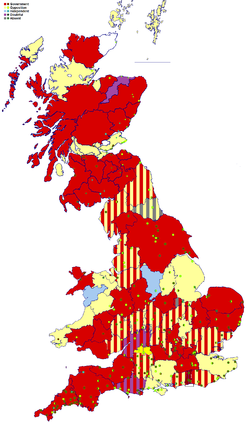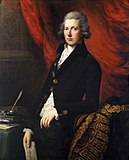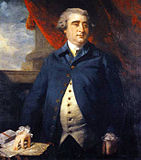British general election, 1784
|
|
||||||||||||||||||||||
|---|---|---|---|---|---|---|---|---|---|---|---|---|---|---|---|---|---|---|---|---|---|---|
|
||||||||||||||||||||||
|
|
||||||||||||||||||||||
|
All 558 seats of the House of Commons 280 seats were needed for a majority |
||||||||||||||||||||||
|
||||||||||||||||||||||

Scarlet represents Government supporters (Pittites); buff Opposition supporters (Foxites and Northites).
|
||||||||||||||||||||||
|
||||||||||||||||||||||
William Pitt the Younger
Pittite
William Pitt the Younger
Pittite
The British general election of 1784 resulted in William Pitt the Younger securing an overall majority of about 120 in the House of Commons of Great Britain, having previously had to survive in a House which was dominated by his opponents.
In December 1783, George III engineered the dismissal of the Fox-North Coalition, which he hated, and appointed William Pitt the Younger as Prime Minister. Pitt had very little personal support in the House of Commons and the supporters of Charles James Fox and Lord North felt that the constitution of the country had been violated. The doctrine that the government must always have a majority in the House of Commons was not yet established and Fox knew he had to be careful.
On 2 February 1784 Fox carried a motion of no confidence which declared "That it is the Opinion of this House, That the Continuance of the present Ministers in their Offices is an Obstacle to the Formation of such an Administration as may enjoy the Confidence of this House, and tend to put an End to the unfortunate Divisions and Distractions of the Country" by 223 to 204. Pitt remained in office, and government supporters ensured petitions and resolutions of borough corporations were presented to Parliament to encourage members to back Pitt, and slowly Members changed sides.
By 1 March, Fox's motion which concluded by "beseech[ing] His Majesty, that He would be graciously pleased to lay the Foundation of a strong and stable Government, by the previous Removal of His present Ministers" was carried but only by 201 to 189. A week later, a more strongly worded motion threatening the withholding of supply was also passed – but only by 191 to 190. Fox thereafter declined to push motions, as his base continued to crumble. Pitt meanwhile decided to go to the country and on 24 March, Parliament was prorogued and on the following day the Parliament first elected in 1780 was dissolved.
...
Wikipedia


